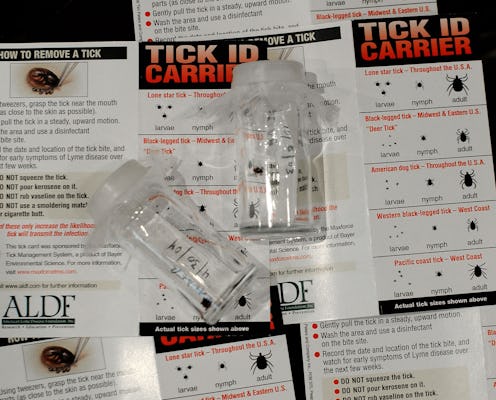
It sounds like it's straight out a science fiction movie, but this is real life: there is a tick whose bite leaves you allergic to meat for an unspecified amount of time, and it is spreading, fast. Dubbed the Lone Star tick, this teensy-tiny arachnid will suck your blood for a meal, then make it nearly impossible for you to enjoy meat again, which is exactly as horrifying as it sounds. Researchers are learning more about this rapidly spreading tick, but they're still searching for answers about the side effects of the bite. For now, though, we need to stay informed on what we do know about the meat allergy transmitted by ticks.
The Lone Star tick is a very small eight-legged tick with a hard outer shell and a small white dot right in the center of its back. It got the name "Lone Star" from both that small white dot. In the last few years, the tick has spread throughout the entire Southeast of the United States, going all the way up to Maine.
Unfortunately, the Lone Star tick is also the most aggressive kind of tick known to man. Unlike other ticks, who wait to stumble upon a host to suck the blood out of, the Lone Star tick actively seeks out a host. They can be found in wooded areas and by ponds or bodies of water where animals drink. Like any other tick, they are tiny and hard to spot.
While the meat allergy isn't the one side effect that comes with a Lone Star tick bite, it is certainly the one getting all of the attention — and for good reason. Here's what we know about this meat allergy so that you can keep yourself safe:
1Its Bite Can Make You Allergic To Alpha-Gal
A bite from a Lone Star tick isn't making you allergic to meat, per se. It's making you allergic to alpha-gal, a sugar molecule found in red meat. According to NPR, Dr. Scott Commins, an allergist and associate professor of medicine at the University of North Carolina, Chapel Hill, says he believes that the reaction is caused by the ticks injecting alpha-gal into human bodies. Our bodies do not make alpha-gal, and alpha-gal is in a human body, the body makes an immune response to it.
Researchers aren't sure exactly how it happens, but they believe that the ticks get the alpha-gal from feeding off wild animals, then inject humans with it when they bite. Commins said, "Whatever the tick is doing, it seems that it's a very potent awakener for our immune system to produce antibodies. And in this case, it's antibodies to this very particular sugar in red meat."
2The Symptoms Of The Allergy Are Unusual
When one thinks of any allergy, they might think of someone sneezing, coughing, or generally feeling awful. This meat allergy is a bit different. Dr. Scott Commins, an associate professor of medicine in the division of rheumatology, allergy & immunology at the Thurston Research Center at the University of North Carolina, Chapel Hill, told USA Today, "It's not the classic 'my throat is closing when I eat peanut butter reaction. These [patients] would get hives and talk about G.I. distress, or needing to go to the bathroom, and itching and swelling. Some would have to go to the ER to get treated." Of course, the reaction can be different for everyone.
One woman told NPR that six hours after eating Italian sausage a few weeks after discovering a Lone Star tick on her body, she woke up with severe hives, lightheadedness, and gastrointestinal problems.
3Unlike Other Allergies, Anyone Is Susceptible
Researchers are particularly stumped about this allergy because it doesn't follow a typical allergy pattern. Usually, an allergy is a result of a mix of genes and environmental factors. Clearly, this one is not - in fact, anyone is susceptible to getting it, no matter what.
4An Allergy To Dairy Could Also Occur
If you've read anything else about the Lone Star tick, you'll see that everyone is focusing on how the bite causes a meat allergy. Many people aren't mentioning that it can also cause a dairy allergy as well. Many patients who became allergic to meat after getting bit reported also feeling the same symptoms when eating dairy products. So, if you're bitten by a Lone Star tick, chances are good that you'll have to cut two major food groups out of your diet.
5It's Unclear How Long The Allergy Lasts Once It's Activated
While researchers really aren't sure exactly how long the meat and dairy allergy will last, they do believe it will go away eventually... hopefully. Commins told NPR that the allergy will eventually go away if people avoid new tick bites. As anyone who spends a lot of time outside knows, though, that can be really difficult. Ticks are super tiny and hard to spot, and preventing them can often mean staying indoors. Wearing layers and socks and covering up is also an option, but not always a viable one in the summer heat.
6There's Nothing You Can Do To Make It Better
As these Lone Star tick bites are still fairly new, doctors aren't aware of a medication that can make symptoms better. Instead, they urge anyone who has been bitten to simply cut meat — and probably dairy — out of their diets.
7The Tick — And The Allergy — Is Spreading
Unfortunately, this tick isn't going to go away any time soon. The range of the Lone Star tick has expanded beyond Southeast United States to the entire Eastern half of the country. Commins told NPR, "We're confident the number is over 5,000 [cases], and that's in the U.S. alone,."